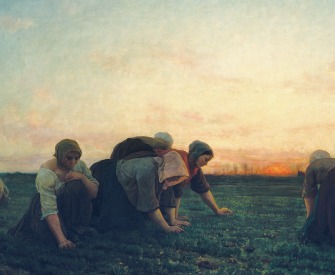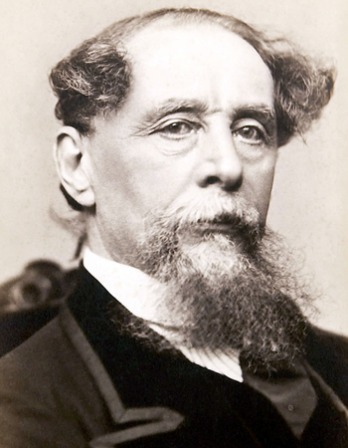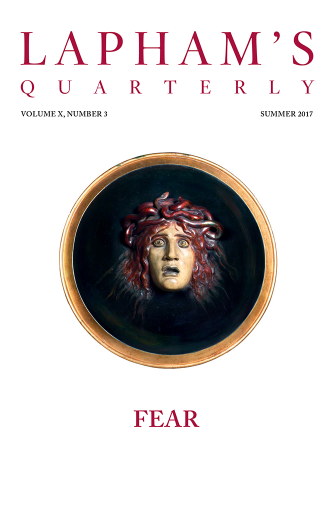Democracy is the recurrent suspicion that more than half of the people are right more than half of the time.
—E.B. White, 1944In the Spotlight
Ralph Ellison loses himself in the heat of the moment.
The speeches began. First an invocation by a Negro preacher; then a woman spoke of what was happening to the children. Then came speeches on various aspects of the economic and political situation. I listened carefully, trying to snatch a phrase here, a word there, from the arsenal of hard, precise terms. It was becoming a high-keyed evening. Songs flared between speeches, chants exploded as spontaneously as shouts at a Southern revival. And I was somehow attuned to it all, could feel it physically. Sitting with my feet on the soiled canvas I felt as though I had wandered into the percussion section of a symphony orchestra. It worked on me so thoroughly that I soon gave up trying to memorize phrases and simply allowed the excitement to carry me along.
Someone pulled on my coat sleeve—my turn had come. I went toward the microphone where Brother Jack himself waited, entering the spot of light that surrounded me like a seamless cage of stainless steel. I halted. The light was so strong that I could no longer see the audience, the bowl of human faces. It was as though a semitransparent curtain had dropped between us, but through which they could see me—for they were applauding—without themselves being seen. I felt the hard, mechanical isolation of the hospital machine, and I didn’t like it. I stood, barely hearing Brother Jack’s introduction. Then he was through, and there was an encouraging burst of applause.
The microphone was strange and unnerving. I approached it incorrectly, my voice sounding raspy and full of air, and after a few words I halted, embarrassed. I was getting off to a bad start, something had to be done. I leaned toward the vague audience closest to the platform and said, “Sorry, folks. Up to now they’ve kept me so far away from these shiny electric gadgets I haven’t learned the technique…And to tell you the truth, it looks to me like it might bite! Just look at it, it looks like the steel skull of a man! Do you think he died of dispossession?”
It worked, and while they laughed someone came and made an adjustment. “Don’t stand too close,” he advised.
“How’s that?” I said, hearing my voice boom deep and vibrant over the arena. “Is that better?”
There was a ripple of applause.
“You see, all I needed was a chance. You’ve granted it, now it’s up to me!”
The applause grew stronger and from down front a man’s far-carrying voice called out, “We with you, Brother. You pitch ’em, we catch ’em!”
That was all I needed; I’d made a contact, and it was as though his voice was that of them all. I was wound up, nervous. I might have been anyone, might have been trying to speak in a foreign language. For I couldn’t remember the correct words and phrases from the pamphlets. I had to fall back upon tradition, and since it was a political meeting, I selected one of the political techniques that I’d heard so often at home: The old down-to-earth, I’m-sick-and-tired-of-the-way-they’ve-been-treating-us approach. I couldn’t see them, so I addressed the microphone and the cooperative voice before me.
“You know, there are those who think we who are gathered here are dumb,” I shouted. “Tell me if I’m right.”
“That’s a strike, Brother,” the voice called. “You pitched a strike.”
“Yes, they think we’re dumb. They call us the ‘common people.’ But I’ve been sitting here listening and looking and trying to understand what’s so common about us. I think they’re guilty of a gross misstatement of fact—we are the uncommon people—”
“Another strike,” the voice called in the thunder, and I paused holding up my hand to halt the noise.
“Yes, we’re the uncommon people—and I’ll tell you why. They call us dumb and they treat us dumb. And what do they do with dumb ones? Think about it, look around! They’ve got a slogan and a policy; they’ve got what Brother Jack would call a ‘theory and a practice.’ It’s ‘Never give a sucker an even break!’ It’s dispossess him! Evict him! Use his empty head for a spittoon and his back for a doormat! It’s break him! Deprive him of his wages! It’s use his protest as a sounding brass to frighten him into silence, it’s beat his ideas and his hopes and homely aspirations into a tinkling cymbal! A small, cracked cymbal to tinkle on the Fourth of July! Only muffle it! Don’t let it sound too loud! Beat it in stop time, give the dumb bunnies the soft-shoe dance! The Big Wormy Apple, the Chicago Get Away, the Shoo Fly Don’t Bother Me!
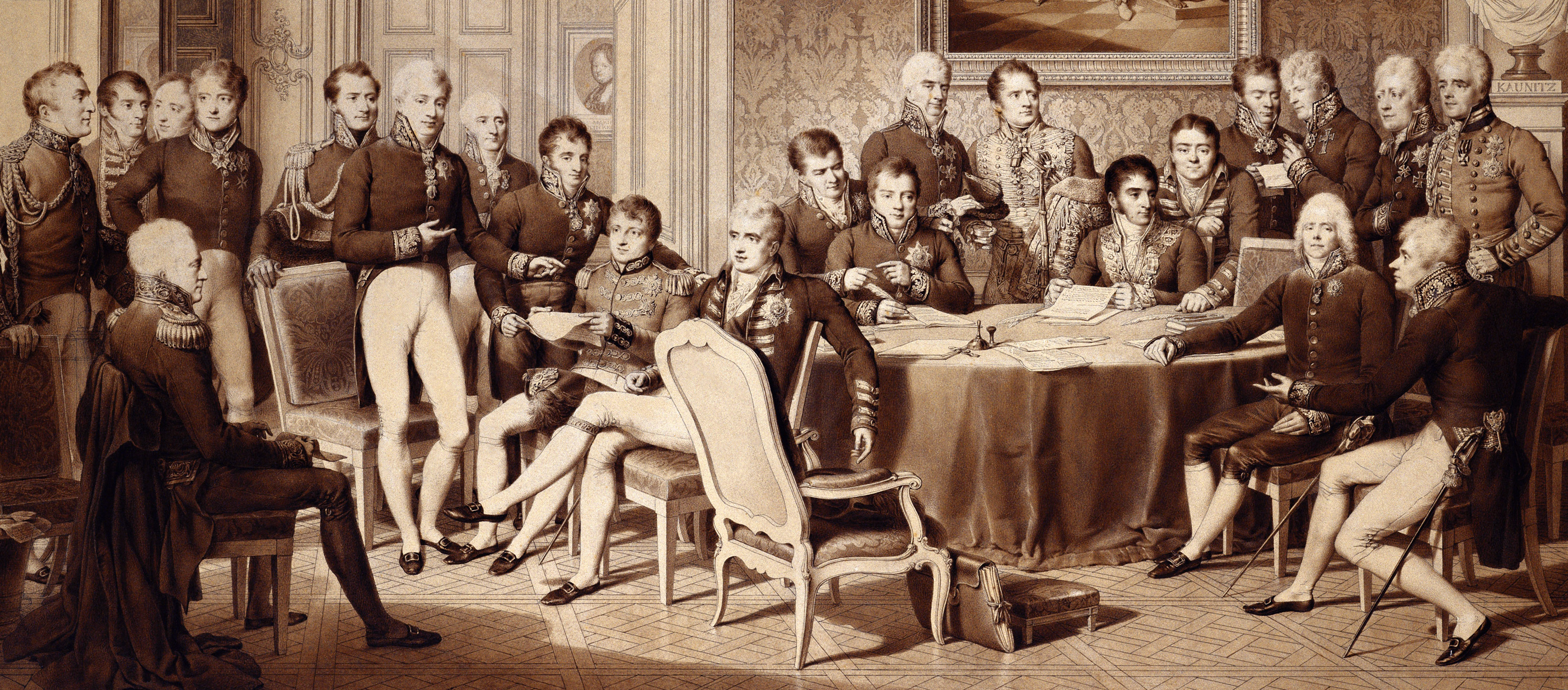
Congress of Vienna, by Jean-Baptiste Isabey, 1815.
“And do you know what makes us so uncommon?” I whispered hoarsely. “We let them do it!”
The silence was profound. The smoke boiled in the spotlight.
“Another strike,” I heard the voice call sadly. “Ain’t no use to protest the decision!” And I thought, Is he with me or against me?
“Dispossession! Dis-possession is the word!” I went on. “They’ve tried to dispossess us of our manhood and womanhood! Of our childhood and adolescence—you heard the sister’s statistics on our infant-mortality rate. Don’t you know you’re lucky to be uncommonly born? Why, they even tried to dispossess us of our dislike of being dispossessed! And I’ll tell you something else—if we don’t resist, pretty soon they’ll succeed! These are the days of dispossession, the season of homelessness, the time of evictions. We’ll be dispossessed of the very brains in our heads! And we’re so un-common that we can’t even see it! Perhaps we’re too polite. Perhaps we don’t care to look at unpleasantness. They think we’re blind—un-commonly blind. And I don’t wonder. Think about it, they’ve dispossessed us each of one eye from the day we’re born. So now we can only see in straight white lines. We’re a nation of one-eyed mice—did you ever see such a sight in your life? Such an un-common sight!”
“An’ ain’t a farmer’s wife in the house,” the voice called through the titters of bitter laughter. “It’s another strike!”
I leaned forward. “You know, if we aren’t careful, they’ll slip up on our blind sides and—plop! Out goes our last good eye, and we’re blind as bats! Someone’s afraid we’ll see something. Maybe that’s why so many of our fine friends are present tonight—blue steel pistols and blue serge suits and all!—but I believe one eye is enough to lose without resistance and I think that’s your belief. So let’s get together. Did you ever notice, my dumb one-eyed brothers, how two totally blind men can get together and help one another along? They stumble, they bump into things, but they avoid dangers too; they get along. Let’s get together, uncommon people. With both our eyes we may see what makes us so uncommon, we’ll see who make us so uncommon! Up to now we’ve been like a couple of one-eyed men walking down opposite sides of the street. Someone starts throwing bricks, and we start blaming each other and fighting among ourselves. But we’re mistaken! Because there’s a third party present. There’s a smooth, oily scoundrel running down the middle of the wide gray street throwing stones—he’s the one! He’s doing the damage! He claims he needs the space—he calls it his freedom. And he knows he’s got us on our blind side and he’s been popping away till he’s got us silly—uncommonly silly! In fact, his freedom has got us damn-nigh blind! Hush now, don’t call no names!” I called, holding up my palm. “I say to hell with this guy! I say come on, cross over! Let’s make an alliance! I’ll look out for you, and you look out for me! I’m good at catching and I’ve got a damn good pitching arm!”
Written laws are like spiderwebs: they will catch, it is true, the weak and poor but would be torn in pieces by the rich and powerful.
—Anacharsis, 550 BC“You don’t pitch no balls, Brother! Not a single one!”
“Let’s make a miracle,” I shouted. “Let’s take back our pillaged eyes! Let’s reclaim our sight; let’s combine and spread our vision. Peep around the corner, there’s a storm coming. Look down the avenue, there’s only one enemy. Can’t you see his face?”
It was a natural pause and there was applause, but as it burst I realized that the flow of words had stopped. What would I do when they started to listen again? I leaned forward, straining to see through the barrier of light. They were mine, out there, and I couldn’t afford to lose them. Yet I suddenly felt naked, sensing that the words were returning and that something was about to be said that I shouldn’t reveal.
“Look at me!” The words ripped from my solar plexus. “I haven’t lived here long. Times are hard, I’ve known despair. I’m from the South, and since coming here I’ve known eviction. I’d come to distrust the world…But look at me now, something strange is happening. I’m here before you. I must confess…”
And suddenly Brother Jack was beside me, pretending to adjust the microphone. “Careful now,” he whispered. “Don’t end your usefulness before you’ve begun.”
‘‘I’m all right,” I said, leaning toward the mic.
“May I confess?” I shouted. “You are my friends. We share a common disinheritance, and it’s said that confession is good for the soul. Have I your permission?”
“You batting .500, Brother,” the voice called.
There was a stir behind me. I waited until it was quiet and hurried on.
“Silence is consent,” I said, “so I’ll have it out, I’ll confess it!” My shoulders were squared, my chin thrust forward and my eyes focused straight into the light. “Something strange and miraculous and transforming is taking place in me right now…as I stand here before you!”
I could feel the words forming themselves, slowly falling into place. The light seemed to boil opalescently, like liquid soap shaken gently in a bottle.
“Let me describe it. It is something odd. It’s something that I’m sure I’d never experience anywhere else in the world. I feel your eyes upon me. I hear the pulse of your breathing. And now, at this moment, with your black-and-white eyes upon me, I feel…I feel…”
I stumbled in a stillness so complete that I could hear the gears of the huge clock mounted somewhere on the balcony gnawing upon time.
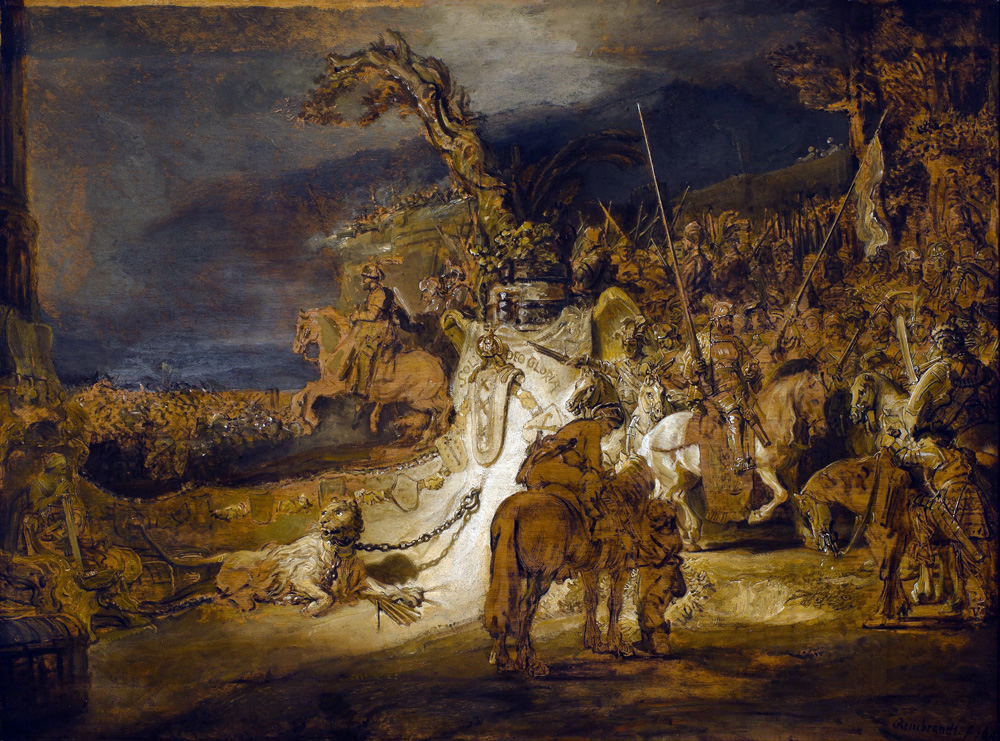
The Concord of the State, by Rembrandt van Rijn, 1637–1645. Museum Boijmans Van Beuningen, Rotterdam.
“What is it, son, what do you feel?” a shrill voice cried.
My voice fell to a husky whisper, “I feel, I feel suddenly that I have become more human. Do you understand? More human. Not that I have become a man, for I was born a man. But that I am more human. I feel strong, I feel able to get things done! I feel that I can see sharp and clear and far down the dim corridor of history, and in it I can hear the footsteps of militant fraternity! No, wait, let me confess…I feel the urge to affirm my feelings…I feel that here, after a long and desperate and uncommonly blind journey, I have come home…home! With your eyes upon me I feel that I’ve found my true family! My true people! My true country! I am a new citizen of the country of your vision, a native of your fraternal land. I feel that here tonight, in this old arena, the new is being born and the vital old revived. In each of you, in me, in us all.
“Sisters! Brothers!
“We are the true patriots! The citizens of tomorrow’s world!
“We’ll be dispossessed no more!”
The applause struck like a clap of thunder. I stood transfixed, unable to see, my body quivering with the roar. I made an indefinite movement. What should I do—wave to them? I faced the shouts, cheers, shrill whistling, my eyes burning from the light. I felt a large tear roll down my face, and I wiped it away with embarrassment. Others were starting down. Why didn’t someone help me get out of the spot before I spoiled everything? But with the tears came an increase of applause and I lifted my head, surprised, my eyes streaming. The sound seemed to roar up in waves. They had begun to stomp the floor and I was laughing and bowing my head, now unashamed. It grew in volume, the sound of splitting wood came from the rear. I grew tired, but still they cheered until, finally, I gave up and started back toward the chairs. Red spots danced before my eyes. Someone took my hand and leaned toward my ear.
“You did it, goddamnit! You did it!” And I was puzzled by the hot mixture of hate and admiration bursting through his words as I thanked him and removed my hand from his crushing grasp.
© 1947, 1948, 1952 by Ralph Ellison, renewed 1975, 1976, 1980. Used with permission of Random House, Inc.

Ralph Ellison
From Invisible Man. Ellison began publishing essays and stories in 1937, worked on the Federal Writers’ Project from 1938 to 1942, and served in the merchant marine during World War II. His only completed novel received the National Book Award in 1953. In 1986 he published the second of two volumes of nonfiction, Going to the Territory, in which he wrote, “A great president is one through whom the essential conflicts of democracy—the struggle between past and present, class and class, race and race, region and region—are brought into the most intense and creative focus.”
